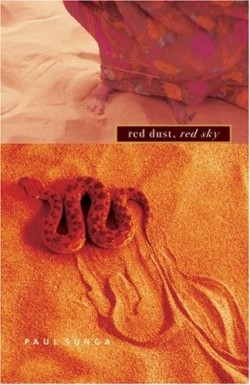
Red Dust, Red Sky
Mysticism, myth, and magic swirl, swagger, and stampede through Sunga’s haunting and frequently harrowing tale set in war-torn South Africa during the waning years of apartheid. Mating cobras are the talismans, and shrunken heads the touchstones that guide Koko, a fatherless Indian girl, on an emotionally arduous campaign to discover the identity of the father she never knew.
A student activist at the heart of the anti-apartheid struggle, Koko’s father died violently at the hands of police investigators. Since his murder, Koko’s mother, brothers, and uncles live in fear of reprisal, and yet Koko remains frustratingly unaware of the underlying source of this constant danger. Chronicling her family’s peripatetic trek from their native India to South Africa and ultimately to a remote and impoverished hamlet in the neighboring kingdom of Lesotho, Koko’s unceasing and unsatisfied quest for truth, in all its illusive glory, renders her both mute and full of wonder.
Like Koko herself, “truth was a shy creature, lurking in the shadows. There were phrases, tones, a certain look in the eyes of the adults. Perhaps this was the truth that had always fetched up beyond my reach, just out of earshot. I suddenly felt that I had always played along, unconscious, perhaps fearful of what I would know.”
Told through dynamic flashbacks that organize diverse elements from the individual and connective episodes of Koko’s extended family into one cohesive story, Sunga’s transcendent and lyrically evocative bildungsroman interprets Koko’s journey of education and maturation through the monsters and witches traditionally reserved for the realm of folklore and fairy tales. A devilish half-antelope/half-human apparition cavorts menacingly, while a chimerical rain doctor assaults the parched land and its equally parched people.
The son of Punjabi immigrants to Canada, Sunga, now serving as the director of International Development at Vancouver’s Langara College, drew upon his experiences representing Canada as an anti-apartheid conference chair while a teacher in Lesotho during the 1980s. Although Koko’s search for information is not an obvious corollary to Lesotho’s struggle against the violent repression and sinister injustice seeping across its borders from South Africa, neither is it ambiguous in depicting the harsh brutality of terror and persecution wrought by human fiends. Indeed, it is Sunga’s multicultural examination of political upheaval that is made all the more powerful for being subtly couched in the self-serving lies and intricate deceptions spun out at a young girl’s expense.
Reviewed by
Carol Haggas
Disclosure: This article is not an endorsement, but a review. The publisher of this book provided free copies of the book to have their book reviewed by a professional reviewer. No fee was paid by the publisher for this review. Foreword Reviews only recommends books that we love. Foreword Magazine, Inc. is disclosing this in accordance with the Federal Trade Commission’s 16 CFR, Part 255.
